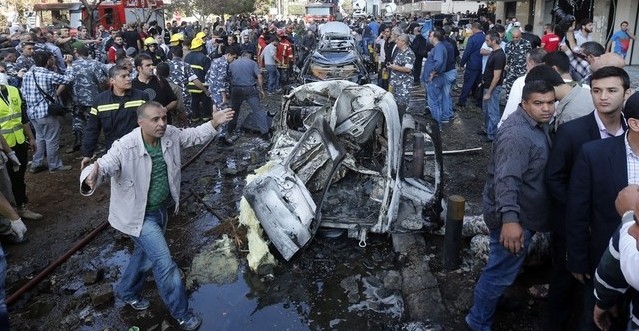IŞİD Beyrut’u da vurdu


12 Kasım Perşembe günü, Paris saldırılarından bir gün önce, Beyrut’un güney banliyösünde yer alan Burc Al Barajine’de iki patlama oldu. 44 kişinin hayatını kaybetmesine, 200’den fazla kişinin yaralanmasına neden olan patlamaların yaşandığı mahalle, Lübnan’da Şii nüfusun en yoğun olduğu ve bu grubun en büyük partisi olan Hizbullah’ın merkezinin bulunduğu bölge.
Yeni dengeler
Son iki yıl içinde, yani Hizbullah’ın Suriye savaşına doğrudan dahil olmasından bu yana, Beyrut’un güney banliyösünde dört ayrı patlama oldu. IŞİD tarafından üstlenilen son bombalamayla, Suriye savaşının Lübnan’a da sıçramış olduğu bir kez daha hatırlanmış oldu. Lübnan’ın kozmopolit nüfus yapısı, bölgesel güçlerin ve dengelerin burada da çatışmasına neden oluyor. Suriye, Irak ve Yemen’de olduğu gibi, Lübnan’da da dengeler Sünni-Şii ekseninde kuruluyor; 12 Kasım saldırıları da, bu dengelerin ve hesaplaşmaların bir parçası.
Dünya kamuoyu Paris’teki saldırılara odaklanmışken, birçok haber ajansı Beyrut saldırılarını da hatırlatarak, IŞİD’e ve benzer yapılanmalara karşı mücadelenin bölgesel olarak sınırlandırılamayacağını, Suriye savaşı gibi büyük bir olayın sınırlarını çizmenin imkânsız olduğunu kanıtlamış oldu. Bir gün arayla Beyrut’tan Paris’e uzanan saldırılar, Ortadoğu’da patlayan bir bombanın etkilerinin, bir anda dünyanın çeşitli merkezlerine yayılabileceğini gözler önüne serdi.
IŞİD’in Lübnan’daki ilk saldırısı olmayan bu eylem, organize niteliği ve yöntemleriyle bir ilk olma özelliği taşıyor. Daha önce kalabalıklar içinde yapılmayan ‘canlı bomba’ eylemi, bu kez bir caminin önünde, namazdan çıkanları ve bir fırının önünde kuyrukta bekleyenleri hedef aldı. Lübnan medyası, saldırılara ‘Ankara sonrası IŞİD taktikleri’ yorumuyla yer verirken, ‘Lübnan İçişleri Güçleri’, aynı gece 11 Suriyeliyi tutukladı. İçişleri Bakanı Nuhad Al Maşnuk, “Bu eylemi, hakkında bilgi sahibi olduğumuz bir cihatçı ağ yaptı. İlgili kişileri tutukladık” dedi.
Suriye’de Rusya’nın müdahaleleri ve Hizbullah güçlerinin ilerlemeleriyle aynı günlere denk gelen saldırılar, her seviyede devam eden savaşı daha da belirgin hale getiriyor.



